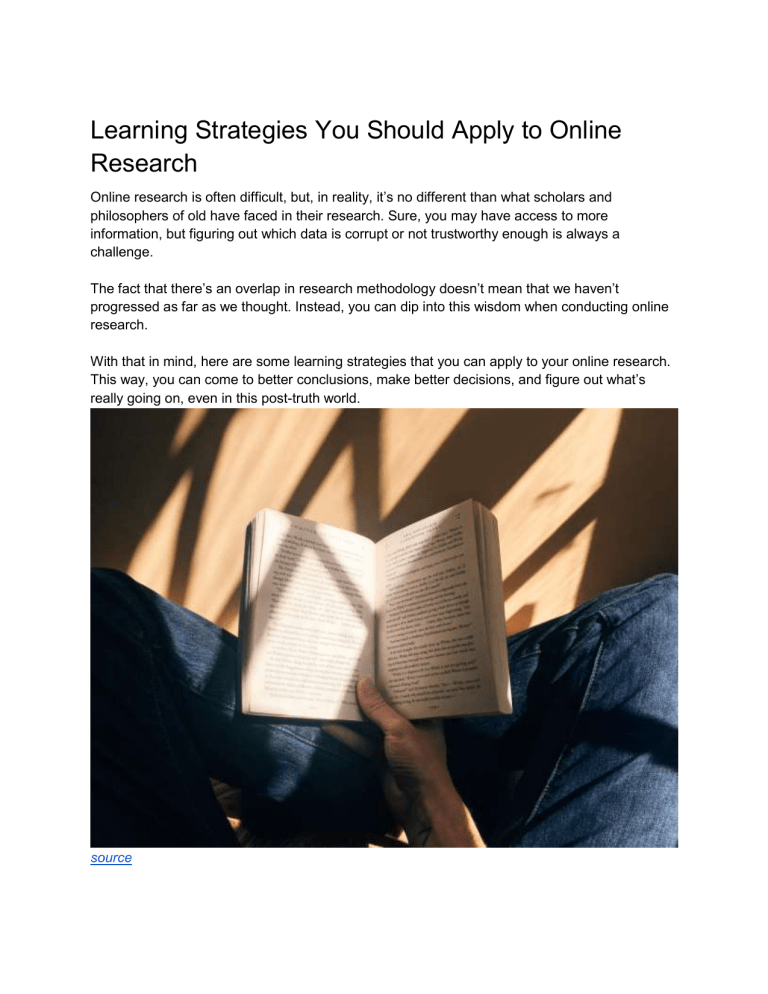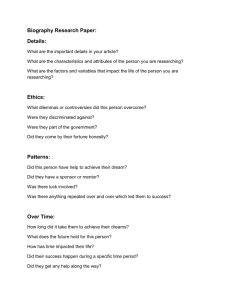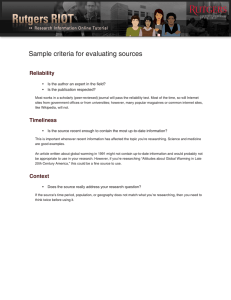
Learning Strategies You Should Apply to Online Research Online research is often difficult, but, in reality, it’s no different than what scholars and philosophers of old have faced in their research. Sure, you may have access to more information, but figuring out which data is corrupt or not trustworthy enough is always a challenge. The fact that there’s an overlap in research methodology doesn’t mean that we haven’t progressed as far as we thought. Instead, you can dip into this wisdom when conducting online research. With that in mind, here are some learning strategies that you can apply to your online research. This way, you can come to better conclusions, make better decisions, and figure out what’s really going on, even in this post-truth world. source 1. Define goals and objectives The first thing you want to do when starting to learn something is ask a question - what’s my end goal here? Learning to pass a test and learning so that you can apply something that you’ve learned are two completely different things. Under different circumstances, both can be completely valid, but you need to decide early on. Usually, there’s something specific that you’re interested in. For instance, you may be researching a new stock or cryptocurrency you plan on buying. You may also study a new baguette recipe to bake something delicious. It’s also important that you set measurable objectives. This won’t always be as easy. If you want to learn how to bake a baguette, this process gives you an incredibly easy test in the end. However, what if you’re trying to invest? Will you wait for a few years for the stock to soar so that you can see that it worked? What about if you wanted to learn a bit about climate change so that you can argue better on the subject? Will you determine the success of your research on the outcome of the next argument? So, stick to something simple, something measurable. For instance, you can set up many questions in advance, and once you have the answers to all these questions, rest assured that you’re on the right track. 2. Use reliable sources Next, you need to use your criteria to determine which sources are reliable. You need to evaluate them critically. Not every source tells the truth, and getting unverified information can sometimes be worse than not getting any information at all. You can start by checking the credentials and the reputation of the author. Regardless of where it’s published, an author probably has their own online brand, which shouldn’t be too hard to track in the modern world. Next, you need to assume biases. Just think of it this way - does the author or the publication have any logical or clear bias for pushing this specific narrative? Just remember that they may have a bias you can never know of, but if it’s obvious, you should be extra careful. This is important for the current content and subsequent documents and files published by the same source. For instance, let’s say that you’re researching cryptocurrencies to invest in, and you’re looking for new releases worth your time and money. It might be a good idea to comb through the past posts and see how often this source has gotten things right. Still, this is all speculative, and it doesn’t have to be definitive (previous success/failure doesn’t guarantee the same in the future), but it does shed some light on who you’re dealing with. 3. Exercise active learning The next thing you need to remember is the importance of active learning. No matter how much data you process, unless you just harvest it and feed it into the system for quick insights, you’ll have to do it the hard way. Namely, just because you’ve read many things doesn’t mean you’ve memorized or even understood any of them. For this to work, you need to have a more systemic approach. We’ve already mentioned the importance of developing research questions. This should be your starting point. This is the first round of questions that you, as someone new to the material, hope it will contain answers to. As you research, make sure to update the questions list. Next, you need to analyze and synthesize this information. This usually means summarizing key points, identifying patterns, or connecting concepts. To do any of these things, you need to really understand the subject matter, which is why they’ll also work as a sort of progress check. Integrating case studies is more important than you think. No, this is not just proof that something works. It’s an actual validation of an idea that the subject has real-world application. If you have the time and energy for it, it might be a great idea to run some simulations or games that will allow you to apply this knowledge. This is arguably the best (and the most fun) way to test your progress. 4. Organize information One of the biggest mistakes you can make while researching is not taking notes. The problem with learning is that most of what you’ve learned will evaporate from your mind within the first hour. The things you remember after an hour are what you remember, but how much will this be? First, figure out the type of research that you’re conducting. This will help you figure out what format of notes you have to take. Sometimes, Docs will be just fine, while Excel/Sheets will be a superior choice in other scenarios. In some scenarios, even MS Paint can prove to be a useful tool. This depends on your findings, but sometimes, when you find contradictory information, you must do a quick audit and remove the least trustworthy notes. Old-school tricks like tags and labels still work, and you shouldn’t skip any kind of advantage available. Getting a tool like a citation manager might also be a neat trick to improve your effectiveness. A far greater challenge is the categorization of data by themes or topics. Sure, sometimes this is quite easy. Remember when we talked about finding the right baguette recipe? Well, you can categorize the ingredients in one column and describe the methodology in stages someplace else. The problem is in fields where the data is not as easy to categorize. Here, you’ll have to be extra creative. 5. Interact with others Sometimes, you need some feedback, and no matter how good of research you’re doing, these materials won’t talk back. Fortunately, there’s an online community for everything. All you need to do is find it and start a discussion on the subject matter. You’ll most likely find it on a Reddit thread or a social media group dedicated to the subject matter. You should start looking for an ongoing discussion; if there isn’t any, you need to start one. Fortunately, it’s easier than it seems. Remember that finding like-minded people means exchanging ideas, running your ideas by them, and figuring out what they know on the subject. Someone out there has probably already done this research, which could save you a lot of time. Other than this, learning through discourse is fun. By having to defend your ideas (or realize how weak these arguments are in practice), you’ll learn so much. Applying old learning techniques to new mediums and materials is what this is all about While the internet, post-world truth, and social media may be new concepts, research is not. Sure, it has evolved slightly, but not nearly as much as expected. You would be surprised at how many of these concepts can be applied to the digital age and with surprising efficiency. All that’s left for you is to try them out and see for yourself.




